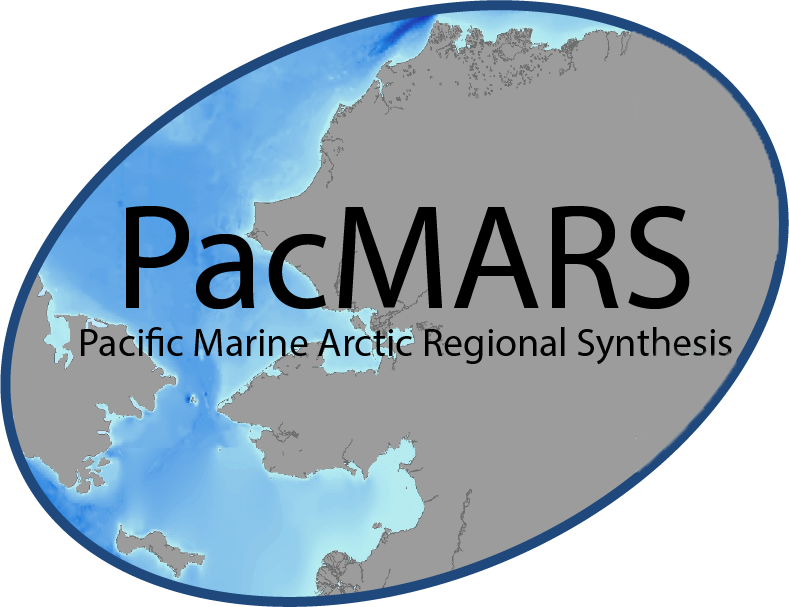PacMARS
The Pacific Marine Arctic Regional Synthesis (PacMARS) is a research synthesis effort underwritten by the North Pacific Marine Research Institute to assemble by mid-year 2013 up-to-date written documentation that contributes to understanding the Pacific-influenced coastal shelf ecosystem of the Arctic Ocean. Our study area extends from Saint Lawrence Island in the Bering Sea through Bering Strait into the Chukchi and Beaufort Seas and our objective is to compile the best available knowledge from local communities, peer-reviewed social and natural sciences, as well as less readily available knowledge sources.
Background
As seasonal sea ice declines in much of the Arctic and reached record minima in 2012, oil and gas exploration is increasing, and additional ship traffic is also using Bering Strait, perhaps a portend of changes to come if the Northern Sea Route along the north coast of Russia becomes a practical ice-free route between Asia and Europe, reducing shipping costs significantly. The Northwest Passage through the Canadian Arctic has also become ice-free several times in recent summers, a significant change. All of the Arctic countries, including Russia, the United States, Canada, and Denmark (Greenland) are exploring the limits of their arctic continental shelves in order to advance claims under the Law of the Sea Treaty.
Within this context of environmental and likely socio-economic changes, wildlife populations and human communities are adjusting to these shifts in seasonal sea ice coverage and climatic warming that has been much more obvious than at lower latitudes. Subsistence hunting patterns in the Arctic are changing, and it is also clear that many organisms, from plankton to top predators may be changing their migration and foraging patterns. Productivity is also forecast to change as sea ice declines and penetration of sunlight into open water increases.
Goals
The overall goal is to provide guidance for scientific research needs in the region, as well as to serve stakeholder needs for understanding this important ecosystem and its vulnerabilities.
The PacMARS synthesis effort is structured to address the uncertainties in knowledge as well as to summarize what is already known. Although the team we have assembled is knowledgeable and cumulatively has many decades of experience collecting and reporting on scientific data from the Pacific Arctic region, we are seeking the help and input of many other scientists, local residents, and other stakeholders in assembling the best current knowledge in a short time frame. The mechanisms for input into this process will include public and invited meetings that will concern data sources, and outreach at scientific conferences such as the Alaska Marine Science Symposium January 21 - 25, 2013. The project team will consult with representatives from the Inupiaq and Yupik communities in the Bering Strait, Northwest Alaska, and Arctic Slope regions during the advisory meetings, to take place in Nome, Kotzebue, and Barrow during early 2013, to facilitate the sharing of ideas between the researchers and the people whose livelihoods are tied to the social and environmental change in the region. Follow-up review of written synthesis products will provide additional methods to gather together the best information on vulnerabilities, potential mitigation, and opportunities in the Arctic during a period of rapid environmental change.
This synthesis is expected to lead within the next two years to new research initiatives by US federal agencies, as well as to bring attention to the findings of several sustained research efforts that have been undertaken in the Pacific Arctic region over the past several decades. We are also actively working with other knowledge synthesis efforts, such as Synthesis of Arctic Research (SOAR) that is underwritten by the Bureau of Ocean Energy Management (BOEM) and the National Oceanic and Atmospheric Administration (NOAA). SOAR has somewhat more expertise than our synthesis effort on higher trophic levels, but the major difference is that it is chartered to synthesis knowledge for the North American Arctic over a longer time frame. As a result the joint results of the efforts may include an overview that can be used in the near future to design appropriate research initiatives for the knowledge uncertainties (PacMARS) as well as a more nuanced view of environmental changes that take into account trends over multi-annual physical and biological cycles (SOAR). We are actively sharing information and participants between the two synthesis efforts.
We welcome your interest and participation as we initiate the PacMARS project in 2012. More information on how the research program was solicited and designed can be found on the new Arctic Webpage maintained by the North Pacific Research Board.
Funded Proposal

